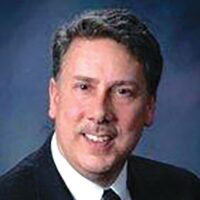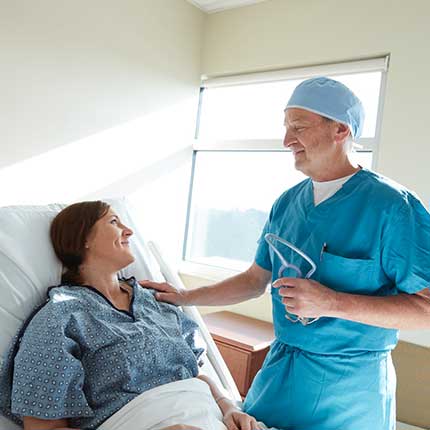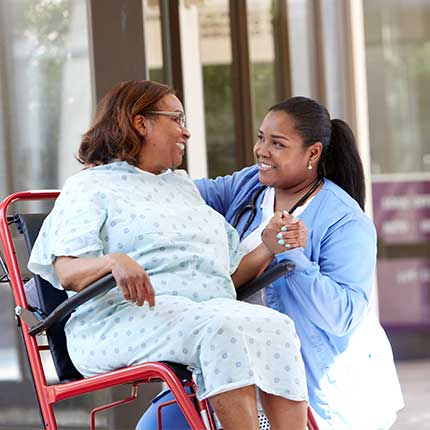One minute interview with DMC Huron Valley-Sinai Hospital CEO David McEwen
Jul 23, 2020
David McEwen was appointed as CEO of Huron Valley-Sinai Hospital, and officially began on March 23.
In March, David McEwen was appointed as CEO of Huron Valley-Sinai Hospital in Commerce Township.
He has more than 25 years of experience as a healthcare executive. He comes to the DMC from Mercy Health Saint Mary’s in Grand Rapids, where he served as chief operating officer. Prior to joining Mercy Health Saint Mary’s he was the vice president of operations for McLaren Hospital in Port Huron. He also served as CEO of Marlette Regional Hospital in Marlette.
The Spinal Column recently sat down with McEwan to learn more about himself and his role as CEO.
Tell us about yourself and your background, and your journey to Huron Valley-Sinai Hospital.
“From 27 years old I’ve been either a hospital CEO or a COO, both in rural and urban areas, and community hospitals. I’ve stayed in those roles because I’ve found that in this sized hospital, it’s just a wonderful blend of strategy and operations. It’s a chance to dream and vision and create, but also be responsible for implementing it and being accountable for the performance. I just love being associated with that level of accountability and helping organizations grow. I’ve only had four jobs in 30 years, so I’ve not moved around much. I’ve chosen my opportunities carefully and this just looked like a wonderful place to join.”
How does it feel to be at Huron Valley?
“The opportunity that drew me was this hospital, coupled with the relationship with the Detroit Medical Center, is a great combination. Community hospitals sometimes are at a disadvantage of not having as deep of a bench when it comes to finance or access to capital or marketing or recruitment, and this is just the best of both worlds. It’s a community-sized hospital while being a member of the DMC that provides so much depth and resources to help us be successful.”
Your first day was March 23, at the height of the coronavirus crisis. How was it adjusting to a new job during a pandemic?
“Oddly, it was an amazing time to meet people. Everyone was in scrubs and masks; it was challenging to get to know people and remember them, but I dressed the part as well. I was frequently on the floors, rounding with our colleagues, asking them if they needed anything. It was a chance to see people at their best, doing what they’re trained and conditioned to do. One of the most fascinating things to witness was the problem solving that went on. This was a new virus, people are working in new conditions, sometimes different hours of the day, and always in the background was this risk of shortages, whether it was medications or supplies or people. On the compassionate side, we’re helping families manage through this fear and keep patients connected in spite of the social restrictions. But what I saw was a group of people come together for the challenge and solve problems very quickly. Ideas turned into habits, which turned into protocols, which then were shared across the DMC and pretty soon they became best practice. We benefited from that as well; we were on the receiving side of that learning as well. No surprise, this is what healthcare workers do, particularly those who are in clinical areas; they triage and solve problems quickly. They develop workarounds quickly. As we were caring for an unknown disease, it was impressive to see how many people were willing to try something different and share their experiences and ask for advice. For 24 hours a day, seven days a week, environmental workers and housekeeping staff and food and nutrition services and nurses and respiratory techs and physicians worked alongside each other; just an extraordinary partnership.”
Tell us about the hospital’s response to COVID-19.
“The DMC, in the end of May, celebrated its 4,000th patient that was treated and discharged. Over that six to eight week immersion, the DMC, as a family, cared for over 4,000 COVID patients and discharged them from the hospital. Huron Valley-Sinai Hospital was selected as a clinical trial site for a couple of drugs in the treatment of COVID. We had the benefit of residents in a deep manpower pool. Some of our staff went to other hospitals, some came here. We shared patients throughout the DMC; when one hospital was at capacity, another hospital stepped in. We shared equipment, we shared medications. I don’t know how we could have done it as an independent, standalone hospital. We just wouldn’t have the resources that we had.”
As COVID cases lessened and restrictions were eased, the hospital has since reinstatedelective surgery procedures. Tell us more.
“While we were managing what was in front of us, the governor had expectations and we were listening very closely to the CDC and the health departments and emergency managers, and sharing information at multiple levels. Thankfully we have emerged from that surge. For Huron Valley and most of DMC, it was half of March, all of April, most of May. We paired our de-escalation process with the direction from the governor, so around end of May, beginning of June, we started seeing a return of elective procedures and some imaging studies that have been put off.”
“As a community, many of us were responsible for taking care of our families and others in our families, it’s also important to remember to take care of yourself. It’s time for people to check back in with their docs. If people don’t have a family physician they can find one that’s near them at dmc.org. It’s important to not put off those screening exams, those preventative maintenance checks, the cancer screenings. People need to keep that responsibility to themselves in the forefront. We’ve modified our areas and our practices to keep up with COVIDfree and COVID-safe zones; we’ve always known how to take care of people that require special accommodations. While our doors were never closed, we did stop providing certain services based on the direction of the governor and focused our energy. It’s important to take care of each other and ourselves. Now that some of these restrictions have been lifted, that would be my encouragement to our community: to not put off emergency care, not put off preventative care. We’re seeing the consequences of people who ignored their own health or neglected it in favor of others. Having a primary care physician in the center of your relationship is just a wise thing to do. If a person has questions, just call your physician’s office and they can help you decide if it’s urgent or if it can wait. We just don’t want people ignoring their own care.”
As the CEO of a community hospital like Huron Valley-Sinai, what is a typical day like for you?
Do you have any direction you’d like to take the hospital moving forward?
“I think there’s still opportunities to grow. I enjoy growing organizations and what really drives my interest is how can we be a better community hospital? How can we provide more service to our community that allows our community to stay closer to home for care? It starts with having the right mix of physicians, the right specialties and the right expertise in-house. Do we have the right testing capabilities and the right equipment? Do we have capacity issues? Are people able to access services they need quickly, timely and in a satisfactory way? What drives my interest most of all is performing really well in the services that we provide locally, and when we can’t provide the service locally being proud of who were handing it off to within our DMC system. We’re fortunate in being part of an eight hospital deep, deep benched system that has virtually every sub-specialty available to our patients. To me that’s just the best of both worlds. Really looking at opportunities to provide as much care as close to home, and when we can’t we can confidently refer patients to a place that can do it.”
Are there any procedures that DMC Huron Valley-Sinai is at the forefront of?
“At Huron Valley we have robotic surgery in two ways: one is called the Mako system and that is primarily for orthopedic surgery, and we also have the da Vinci [Surgical System] that’s used in a number of specific specialties. Huron Valley just received straight A’s from Leapfrog, which is a national watchdog group that ranks hospitals’ clinical and safety performance. It was the seventeenth time in a row that Huron Valley has received that grade; it’s awarded twice a year. The only other health system in Michigan that has matched that is the University of Michigan. We had a very successful Joint Commission accreditation survey, that’s the national accrediting body for most hospitals. We have a very robust oncology, cardiology, orthopedics, mother-baby service line, and I think our staff are very proud of those service lines because they are a series of care that a person and family often need, and being close to home is very important. The DMC celebrates having one of a very few children’s hospitals in the state, with two locations in Troy and downtown Detroit. Children’s is a level one trauma center for pediatric care. It’s also the regional burn center and poison control center for southeast Michigan. The Rehab Institute of Michigan is another family member within DMC, a very unique facility in the state that is devoted exclusively to rehabilitation, in most cases post-injury or stroke. Just an amazingly deep bench.”
“It’s a wonderful feature to have for a community hospital. We have access to capital, lower financing costs, clinical expertise that we otherwise wouldn’t have as a community hospital.”
Is there anything that the community can do to help healthcare workers and frontline heroes amidst the COVID-19 pandemic?
“I think the important thing to know is the DMC is committed to the safety of our patients and visitors. People who come to Huron Valley or any other DMC hospital can be sure that they’re entering a safe and secure environment. We’ve adopted very rigorous screening protocols for everyone who walks through the door, including our own staff. We’ve modified our work environment to respect the social distance that’s needed to keep people safe, we’ve created safe zones for people who are otherwise healthy, and we’ve created COVID-care zones for people who need that specialized attention. We’ve loosened our visitor restrictions based on the governor’s guidance, and we’ve increased COVID testing for patients who require it.”
“Hopefully we look differently at any respiratory illness, I know we are in hospitals. This experience has given us pause and an opportunity to re-examine a lot of our practices to be more proactive and more preventative.”
Source:
https://www.spinalcolumnonline.com/articles/1-min-interview-with-dmc-huron-valley-sinai-hospital-ceo-david-mcewen/



